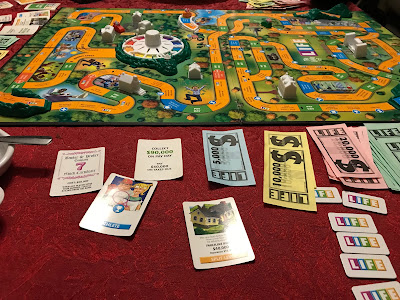A Last-Ditch Effort To Enable Your Kids To Make It
It’s something many are already doing anyway
 |
| The Game of Life ... they probably should make this game much harder now if they want it to be realistic. |
But there was one thing I could do to boost my 20-something kid’s finances: Invite him to move back home. And the results were so positive that I want to encourage every non-wealthy family to think about this option.
Living at home would have been unthinkable to me as a young person; I could not wait to move out. I spent the summer of my freshman year back home, and after that I spent my summers on campus, living on a few hundred dollars per month. My independence was so important to me that I didn’t mind poverty. Plus, my parents lived in a tiny town with no jobs.
I married while still in college and had my first baby two years later. We started with nothing and stayed there for a long time. I remember chipping away at bills, frustrated at our inability to get ahead. My first mortgage, in 1990, carried a 9.5 percent interest rate! When the furnace went out, we had to go into debt to replace it, again with a punitive interest rate. We did without a lot of things. And it struck me, even then, just now much interest we paid. Each month, the amount of interest we paid on the house and the furnace and the car were our biggest expenses. We were a gold mine for the banking industry, and it made me angry, but we were trapped.
Meanwhile, I kept reading about how important it was to start saving and investing early. I saw the charts that illustrated how saving a modest amount of money when you’re young will yield a better retirement than saving relatively larger amounts when you’re older. It made sense. I was willing but unable. Instead, I learned to make everything from scratch to save on groceries and continued doing without a lot of things.
My daughter married soon after college and has two children, a master’s degree and a lot of student loan debt, which she and her family will be dealing with for a long, long time. My son took a circuitous path and found himself with student loans from one year at a state university and more loans from a community college welding program.
Where we live, the barebones cost of rent and utilities runs about $1,000 per month. By living at home, my son had zero rent and utilities. He had free laundry facilities and benefited from the family groceries and wifi. He had a car loan, cellphone and car insurance to pay for himself. He was able to stay on his father’s health insurance at that point because he was under 26.
He had lived on his own, barely making ends meet, for several years, when a sudden extra expense topped his Jenga-like finances. I invited him home so he could make a stronger launch later.
It made all the difference. By taking the money he would have spent on basic living expenses out of the equation, he was able to put it all toward paying off his debt. He’d been unable to find anything better than the fast food job he’d had since he was 16, because nobody was hiring welders at the point when he finished school; all the local employers were laying them off. But he persisted and eventually found decent employment. It still wouldn’t have been enough to do more than cover the most basic living expenses, however. He’d have been chipping away at his debt for a decade.
My son was only too happy to get out from under debt. Even while languishing at his fast food job, he’d try to pay extra on student loan payments. Once those were gone, he worked on paying for a newish Corolla. It went even faster once he landed his welding job, because he did not allow lifestyle creep to absorb the extra money he was making. Instead, the extra income went into making extra payments. Once he was debt-free, he built up an emergency fund and enough money to furnish his future new place nicely.
You can very rapidly pay down debt when you start making payments many times larger than required. When I went back to work in 1997, I was making pretty shitty money — $17,500 at first. But because it was “new money” to us, I didn’t spend much of it. I made triple or sometimes quadruple house payments instead, which allowed us to buy a much better house after a couple of years.
Many years ago, I recommended this concept to someone who was living with her parents but spending lavishly (in my eyes, anyway) on little luxuries. I suggested she put back a thousand dollars a month in savings so she could buy a house. Her answer was, “How much money do you think I make?” I knew how much money she made. I also knew that if she’d had her own apartment at that point, that was about what she’d be spending on rent and utilities.
When my son became eligible for his new employer’s 401(k). I urged him to put much more into it than he’d first planned. “It’ll never be easier than now,” I told him, and with my encouragement he decided to put in a sizable percentage. He can always decrease the amount later if he needs to. I never managed to put away anything close to that, ever. I’ll never be able to retire, but by tucking away money while still in his 20s, my son may be able to retire when he’s younger than I am now.
My son had saved up enough to get his own place about the time Covid struck, and by coincidence, my former house that I was renting out became available then, so now he rents from me. It’s a bit more house than he needs as a single guy, but we both benefit: I get a tenant who keeps the place up and always pays on time, and he gets to live in his childhood home and has a landlord he trusts.
My son is doing very well with his job now; he makes much more money as a young welder than I ever made at the top of my game as the editor of a daily newspaper.
I grew up wanting so badly to be on my own. My son’s financial freedom came about because he was willing to be dependent on me for a few more years. (Just another reason to believe the American cult of individuality is a sick one.)
This won’t work for everyone. You need to have a close and respectful relationship with your child. It wouldn’t have worked if my son hadn’t pitched in on his share of the chores or if he didn’t have a job that at least allowed him to pay for his own basic personal expenses. It wouldn’t have worked if I had treated him like a kid instead of as another adult in the house. It wouldn’t have worked if he hadn’t continued diligently looking for a better job. (This step is no doubt easier now, in 2022, than it was when he was trying so hard to get that first good job several years ago.)
We are lucky to live in an affordable area (though of course that means we also generally make lower salaries compared to people who live in more expensive areas). I’m shocked to read that ordinary people are paying several hundred thousand bucks for houses. I’ve owned four houses, and all of them together did not add up to the average cost of houses today. It’s no wonder so many younger people are living at home longer. The median U.S. wage is about $35,000 and the average house cost is about $350,000. If you can make intergenerational living work for a few years, you can save a literal fortune in interest — and possibly change the financial trajectory of the next generation. I don’t even want to know how much I’ve paid in my lifetime in mortgage interest, but I resent every single penny of it. Keep as much of that money in your family as you can.


Comments
Post a Comment